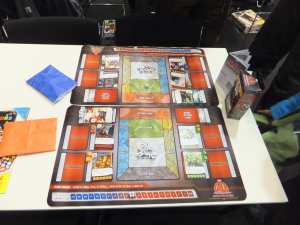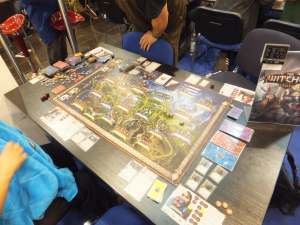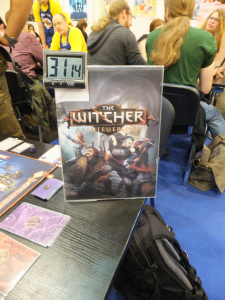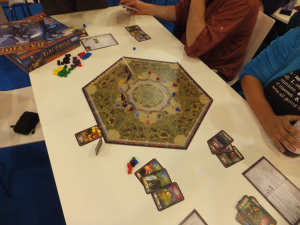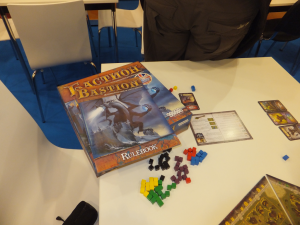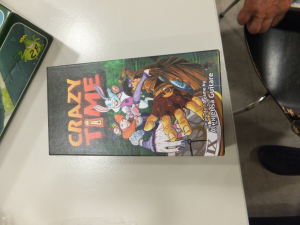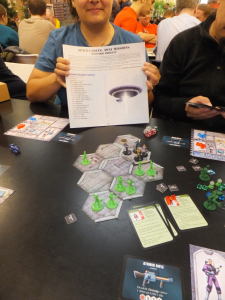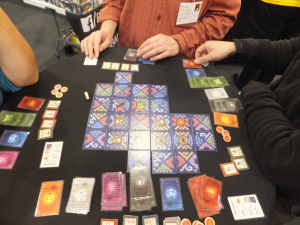In Beast News, our blogtour is supposed to start today, but with the time shifts, it might not be my today (so you'll be getting the link tomorrow, if all goes well). We do have our first two reviews at Amazon, though, to our great delight, and three more over at Goodreads!
(Reviews really help selling books, so if you like a book and would like to help the authors sell more of it, you can do so by writing and posting a review. Amazon is an obvious place for this, as lots of people check there for reviews even if they buy in brick-and-mortar or at different online shops; goodreads is another good place, but anywhere on the internet will help your favourite author to do better.)
More book-related stuff? Here you go. The book from Jutta Zander-Seidel, "Textiler Hausrat" has been digitised and is available for free at ART-Dok, together with several other titles by Zander-Seidel. (Hat tip to Nicole Kipar from kipar.org, which is a blog you might want to follow as well.)
And now I have some non-work-related stuff for you. Games! Games we played at Essen! Not all of them, mind you - just a few.
Before you read my comments, you should probably know that I tend to be quite critical of games. We've been doing this go-to-Essen-thing for years now, playing oodles of games, and we (that is me and my friends who usually roam the halls together with me and the Most Patient Husband of Them All) have developed quite a good sense for what games we prefer. So we'll often take just a look at a game and go "meh", not necessarily because it is a bad game, but not a type we like. (Those preferences are different for each of our group, but they overlap for a good part, which makes roaming together so pleasant.)
There's so many games out there, and so many new ones coming out each year, that you can either set apart a huge amount of space for all those games you get, or you restrict the amount you're getting. We try to go for option 2, so if we buy a game, it has to really please us and offer a good amount of replayability. We tend to gravitate towards games that are (relatively) quick to explain but still want some brains when playing; with a luck factor involved (so no hardcore strategical/tactical games). We also have a thing for cooperative games and racing games. And now that you know how to put my comments into context, here we go!
We started out with a round of Marvel Dice Masters - which was fun. It's a light game, lots of dice, though some of the rules were not completely clear. We already have several copies of King of Tokyo in our circle of friends, so we really don't need this game. I'd play it again though, happily.
The Witcher. I don't know the video game, but I can tell you that the boardgame is repetitive and boring. Boring and repetitive. Oh, did I mention repetitive? So many tasks to fulfill. Joyless combat. Everyone playing for themselves. We broke off after (or in, I don't remember) the second round of this. Boooooring. (You see the timer attached to the stand? We'd have had 31 more minutes to waste on this game - everyone gets an hour to testplay. Which tells you we spent 29 minutes on this. Which was more than enough.)
This game was called Bastion (as the English rulebook on the table tells you), it was a cooperative game, and we didn't expect much from it. The coloured cubes are the resources you need to collect in order to battle monsters that approach your city gates - you spend one of any colour to get three of the colour marked on the board. Once there are cubes on the segment, you can remove all of them (up to three) by placing a cube on the inner wall, and you can clear all the cubes off the inner wall by hopping inside. A monster you smashed gives you a bonus for smashing another monster, or for movement. The monsters always jump to the next free spot, and when the monster deck is used up, they leapfrog forwards; the very last monster jumps directly to the city gate and you have to smash it there at once. There's not too much luck involved, it is easy to explain and it does require you to think and plan ahead with your mates - we really liked it! Bastion would make a very nice gateway game, and it looks like you can up the difficulty quite a bit with stronger monster cards (that are included).
Crazy Time. You have a stack of cards and flip them over; each of them shows a clock face with a time. You count the time upwards, starting with "one", next player flips a card and says "two", next one flips and says "three"... unless there's a time machine, when you have to count backwards. Or there's a new rule that gets introduced. Fun twist? One of the players does not know the new rule and has to guess it (or gets lots of cards for making mistakes!). Original rules let the winner of a round choose who does not get to see the rules cards; I'd recommend as house rule: winner of the round does not get to see the rules cards (for a bit of a rubber-band effect). Lovely little game. Quick to explain, quick to get started with, but a really nasty brain teaser.
This was another co-op: Space Cadets - Away Mission. Lots of plastic minis, lots of tiles, different scenarios, different aliens, space in the flavour of 1960s sci-fi. Oh, and girly-glittery dice. We really enjoyed this. Actually, we enjoyed this so much that we bought it. (Our excuse? Well, apart from you don't need an excuse to buy a game you really love apart from "we really loved this", our excuse is that we did not have any space-themed co-op games yet. Also, the minis include brain-in-a-jar figures, and everyone knows you can always use more brains.)
And this is... Lanterns. You place one of your three tiles and each of the four players gets a lantern card in the colour facing them. If you place matching colours, you also get bonus cards. On your next turn, you can exchange colour combinations for tiles with victory points. It's a relatively light game, with an interesting concept - however, luck obviously plays a big part. (Frieder suffered from always just missing the higher value numbers on the victory point tiles, for instance.) We played the "short fair version" with about half the available tiles and already found it too long. Add some players in there that tend towards analysis-paralysis (huh, if I place that tile like this, he gets a green and player 3 gets a yellow and then they have a full set but if I place it like this I don't get a bonus... hm... let me look at my other two tiles... if I place this one like this, ah, or maybe here, or...) and you're in for a really, really tedious game. No thanks.
And that's it for today. If you enjoyed that, let me know - I have a few more games I could tell you about...
(Reviews really help selling books, so if you like a book and would like to help the authors sell more of it, you can do so by writing and posting a review. Amazon is an obvious place for this, as lots of people check there for reviews even if they buy in brick-and-mortar or at different online shops; goodreads is another good place, but anywhere on the internet will help your favourite author to do better.)
More book-related stuff? Here you go. The book from Jutta Zander-Seidel, "Textiler Hausrat" has been digitised and is available for free at ART-Dok, together with several other titles by Zander-Seidel. (Hat tip to Nicole Kipar from kipar.org, which is a blog you might want to follow as well.)
And now I have some non-work-related stuff for you. Games! Games we played at Essen! Not all of them, mind you - just a few.
Before you read my comments, you should probably know that I tend to be quite critical of games. We've been doing this go-to-Essen-thing for years now, playing oodles of games, and we (that is me and my friends who usually roam the halls together with me and the Most Patient Husband of Them All) have developed quite a good sense for what games we prefer. So we'll often take just a look at a game and go "meh", not necessarily because it is a bad game, but not a type we like. (Those preferences are different for each of our group, but they overlap for a good part, which makes roaming together so pleasant.)
There's so many games out there, and so many new ones coming out each year, that you can either set apart a huge amount of space for all those games you get, or you restrict the amount you're getting. We try to go for option 2, so if we buy a game, it has to really please us and offer a good amount of replayability. We tend to gravitate towards games that are (relatively) quick to explain but still want some brains when playing; with a luck factor involved (so no hardcore strategical/tactical games). We also have a thing for cooperative games and racing games. And now that you know how to put my comments into context, here we go!
We started out with a round of Marvel Dice Masters - which was fun. It's a light game, lots of dice, though some of the rules were not completely clear. We already have several copies of King of Tokyo in our circle of friends, so we really don't need this game. I'd play it again though, happily.
The Witcher. I don't know the video game, but I can tell you that the boardgame is repetitive and boring. Boring and repetitive. Oh, did I mention repetitive? So many tasks to fulfill. Joyless combat. Everyone playing for themselves. We broke off after (or in, I don't remember) the second round of this. Boooooring. (You see the timer attached to the stand? We'd have had 31 more minutes to waste on this game - everyone gets an hour to testplay. Which tells you we spent 29 minutes on this. Which was more than enough.)
This game was called Bastion (as the English rulebook on the table tells you), it was a cooperative game, and we didn't expect much from it. The coloured cubes are the resources you need to collect in order to battle monsters that approach your city gates - you spend one of any colour to get three of the colour marked on the board. Once there are cubes on the segment, you can remove all of them (up to three) by placing a cube on the inner wall, and you can clear all the cubes off the inner wall by hopping inside. A monster you smashed gives you a bonus for smashing another monster, or for movement. The monsters always jump to the next free spot, and when the monster deck is used up, they leapfrog forwards; the very last monster jumps directly to the city gate and you have to smash it there at once. There's not too much luck involved, it is easy to explain and it does require you to think and plan ahead with your mates - we really liked it! Bastion would make a very nice gateway game, and it looks like you can up the difficulty quite a bit with stronger monster cards (that are included).
Crazy Time. You have a stack of cards and flip them over; each of them shows a clock face with a time. You count the time upwards, starting with "one", next player flips a card and says "two", next one flips and says "three"... unless there's a time machine, when you have to count backwards. Or there's a new rule that gets introduced. Fun twist? One of the players does not know the new rule and has to guess it (or gets lots of cards for making mistakes!). Original rules let the winner of a round choose who does not get to see the rules cards; I'd recommend as house rule: winner of the round does not get to see the rules cards (for a bit of a rubber-band effect). Lovely little game. Quick to explain, quick to get started with, but a really nasty brain teaser.
This was another co-op: Space Cadets - Away Mission. Lots of plastic minis, lots of tiles, different scenarios, different aliens, space in the flavour of 1960s sci-fi. Oh, and girly-glittery dice. We really enjoyed this. Actually, we enjoyed this so much that we bought it. (Our excuse? Well, apart from you don't need an excuse to buy a game you really love apart from "we really loved this", our excuse is that we did not have any space-themed co-op games yet. Also, the minis include brain-in-a-jar figures, and everyone knows you can always use more brains.)
And this is... Lanterns. You place one of your three tiles and each of the four players gets a lantern card in the colour facing them. If you place matching colours, you also get bonus cards. On your next turn, you can exchange colour combinations for tiles with victory points. It's a relatively light game, with an interesting concept - however, luck obviously plays a big part. (Frieder suffered from always just missing the higher value numbers on the victory point tiles, for instance.) We played the "short fair version" with about half the available tiles and already found it too long. Add some players in there that tend towards analysis-paralysis (huh, if I place that tile like this, he gets a green and player 3 gets a yellow and then they have a full set but if I place it like this I don't get a bonus... hm... let me look at my other two tiles... if I place this one like this, ah, or maybe here, or...) and you're in for a really, really tedious game. No thanks.
And that's it for today. If you enjoyed that, let me know - I have a few more games I could tell you about...




